
 Copyright 2004 by The McGraw-Hill Companies, Inc. All rights reserved. Except as permitted under the United States Copyright Act of 1976, no part of this publication may be reproduced or distributed in any form or by any means, or stored in a database or retrieval system, without the prior written permission of the publisher. ISBN: 978-0-07-177171-9
Copyright 2004 by The McGraw-Hill Companies, Inc. All rights reserved. Except as permitted under the United States Copyright Act of 1976, no part of this publication may be reproduced or distributed in any form or by any means, or stored in a database or retrieval system, without the prior written permission of the publisher. ISBN: 978-0-07-177171-9
MHID: 0-07-177171-9 The material in this eBook also appears in the print version of this title: ISBN: 978-0-07-142646-6, MHID: 0-07-142646-9. All trademarks are trademarks of their respective owners. Rather than put a trademark symbol after every occurrence of a trademarked name, we use names in an editorial fashion only, and to the benefit of the trademark owner, with no intention of infringement of the trademark.
Where such designations appear in this book, they have been printed with initial caps. McGraw-Hill eBooks are available at special quantity discounts to use as premiums and sales promotions, or for use in corporate training programs. To contact a representative please e-mail us at bulksales@mcgraw-hill.com. TERMS OF USE This is a copyrighted work and The McGraw-Hill Companies, Inc. (McGraw-Hill) and its licensors reserve all rights in and to the work. Use of this work is subject to these terms.
Except as permitted under the Copyright Act of 1976 and the right to store and retrieve one copy of the work, you may not decompile, disassemble, reverse engineer, reproduce, modify, create derivative works based upon, transmit, distribute, disseminate, sell, publish or sublicense the work or any part of it without McGraw-Hills prior consent. You may use the work for your own noncommercial and personal use; any other use of the work is strictly prohibited. Your right to use the work may be terminated if you fail to comply with these terms. THE WORK IS PROVIDED AS IS. McGRAW-HILL AND ITS LICENSORS MAKE NO GUARANTEES OR WARRANTIES AS TO THE ACCURACY, ADEQUACY OR COMPLETENESS OF OR RESULTS TO BE OBTAINED FROM USING THE WORK, INCLUDING ANY INFORMATION THAT CAN BE ACCESSED THROUGH THE WORK VIA HYPERLINK OR OTHERWISE, AND EXPRESSLY DISCLAIM ANY WARRANTY, EXPRESS OR IMPLIED, INCLUDING BUT NOT LIMITED TO IMPLIED WARRANTIES OF MERCHANTABILITY OR FITNESS FOR A PARTICULAR PURPOSE. McGraw-Hill and its licensors do not warrant or guarantee that the functions contained in the work will meet your requirements or that its operation will be uninterrupted or error free.
Neither McGraw-Hill nor its licensors shall be liable to you or anyone else for any inaccuracy, error or omission, regardless of cause, in the work or for any damages resulting therefrom. McGraw-Hill has no responsibility for the content of any information accessed through the work. Under no circumstances shall McGraw-Hill and/or its licensors be liable for any indirect, incidental, special, punitive, consequential or similar damages that result from the use of or inability to use the work, even if any of them has been advised of the possibility of such damages. This limitation of liability shall apply to any claim or cause whatsoever whether such claim or cause arises in contract, tort or otherwise.
Contents
Introduction
When you study English verbs, you must do more than search for their meanings in a dictionary. You must also learn how to conjugate them and use these conjugations appropriately.
Most students begin their studies by memorizing verb forms. They learn both the verb endings for regular verbs and the more complicated forms of the irregular verbs. Practice Makes Perfect: English Verbs provides you with opportunities to practice conjugating more than three hundred verbs, both regular and irregular. However, this text is more than a list of verb forms and mechanical exercises. It also presents the reasons for choosing one verb form over another. For example, you may know the dictionary meaning of walk, but to use this verb to refer to the future, you must understand your options; that is, you must understand the role of tense and aspect.
To indicate future, you could say Ill walk to school today, Im going to walk to school today, or Im walking to school today, but not I walk to school today. When most people think of tense, they think of time. While it is true that tense is sometimes related to present, past, and future time, this is not always the case. In the sentence My plane leaves in twenty minutes, the simple present tense of the verb leave is used to refer to future time. As well as being marked for tense, verbs are marked for aspect. I study English and I am studying English are both in the present tense, but they differ in aspect. I study English and I am studying English are both in the present tense, but they differ in aspect.
The verb in the first sentence refers to a habitual action; the verb in the second sentence refers to an action that is not yet completed. To indicate both tense and aspect, study is said to be in the simple present and am studying is said to be in the present progressive. In the sentence I had been studying for the test when the phone rang, there are two main verbs: study and ring. They are both in the past tense; however, they differ in aspect. Had been studying is the past perfect progressive, whereas rang is just the simple past. The difference in aspect indicates that the action of studying was ongoing and prior to the action of ringing.
Tense and aspect intersect in the following way.  The form and meaning of each of these tense-aspect combinations will be described in the units of this book. Although you will study all the tenses mentioned in traditional textbooks, you will also study the concept of aspect so that you will have a deeper understanding of the grammatical meaning conveyed by the form of a verb. Thus, as you work through the material in Practice Makes Perfect: English Verbs, you will learn not only how to conjugate verbs but also why to use specific verb forms. Any study of verbs would be incomplete without the inclusion of special types of verbs and complementation patterns. After you become familiar with verb conjugations, you will study phrasal verbs, modal verbs, and verb complementation (gerunds and infinitives).
The form and meaning of each of these tense-aspect combinations will be described in the units of this book. Although you will study all the tenses mentioned in traditional textbooks, you will also study the concept of aspect so that you will have a deeper understanding of the grammatical meaning conveyed by the form of a verb. Thus, as you work through the material in Practice Makes Perfect: English Verbs, you will learn not only how to conjugate verbs but also why to use specific verb forms. Any study of verbs would be incomplete without the inclusion of special types of verbs and complementation patterns. After you become familiar with verb conjugations, you will study phrasal verbs, modal verbs, and verb complementation (gerunds and infinitives).
This book focuses on the verbs most frequently used in English. It is appropriate for classroom use or individual study. If you are in a class, your teacher may choose to assign exercises to supplement your other coursework. If you are studying alone, you can use the Answer Key at the back of the book to check your work and decide whether you should review a chapter or go on to the next. There are six principal parts in this book: PART ITHE PRESENT TENSE The five units in will help you learn the verb forms that constitute four different tense-aspect combinations: simple present, present progressive, present perfect, and present perfect progressive. You will practice using these forms in positive statements, negative statements, and questions.
You will also learn how to form contractions with pronouns or the word not. A special section focuses on the verb be. PART IITHE PAST TENSE The five units in , you will practice using these tense-aspect combinations and their contracted forms in positive statements, negative statements, and questions. In this part also, there is a special section focusing on the verb
Next page

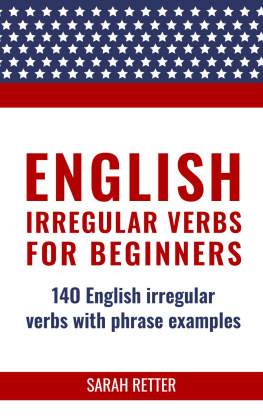
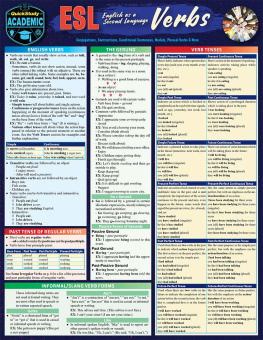
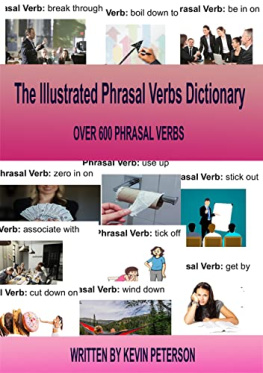
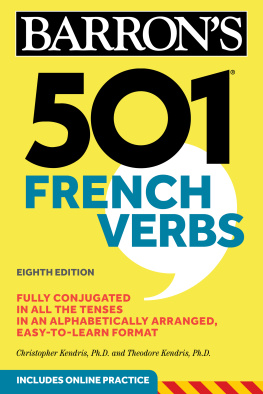
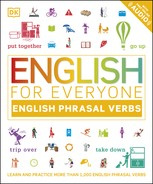


 Copyright 2004 by The McGraw-Hill Companies, Inc. All rights reserved. Except as permitted under the United States Copyright Act of 1976, no part of this publication may be reproduced or distributed in any form or by any means, or stored in a database or retrieval system, without the prior written permission of the publisher. ISBN: 978-0-07-177171-9
Copyright 2004 by The McGraw-Hill Companies, Inc. All rights reserved. Except as permitted under the United States Copyright Act of 1976, no part of this publication may be reproduced or distributed in any form or by any means, or stored in a database or retrieval system, without the prior written permission of the publisher. ISBN: 978-0-07-177171-9 The form and meaning of each of these tense-aspect combinations will be described in the units of this book. Although you will study all the tenses mentioned in traditional textbooks, you will also study the concept of aspect so that you will have a deeper understanding of the grammatical meaning conveyed by the form of a verb. Thus, as you work through the material in Practice Makes Perfect: English Verbs, you will learn not only how to conjugate verbs but also why to use specific verb forms. Any study of verbs would be incomplete without the inclusion of special types of verbs and complementation patterns. After you become familiar with verb conjugations, you will study phrasal verbs, modal verbs, and verb complementation (gerunds and infinitives).
The form and meaning of each of these tense-aspect combinations will be described in the units of this book. Although you will study all the tenses mentioned in traditional textbooks, you will also study the concept of aspect so that you will have a deeper understanding of the grammatical meaning conveyed by the form of a verb. Thus, as you work through the material in Practice Makes Perfect: English Verbs, you will learn not only how to conjugate verbs but also why to use specific verb forms. Any study of verbs would be incomplete without the inclusion of special types of verbs and complementation patterns. After you become familiar with verb conjugations, you will study phrasal verbs, modal verbs, and verb complementation (gerunds and infinitives).